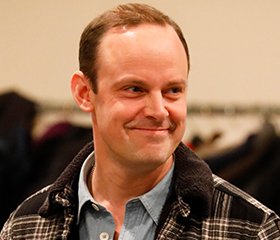“The joy of playing real people,” Harry Hadden-Paton told me this week over morning coffee, “is that there’s so much material you can draw on.” We were talking about Aldous Huxley, who Hadden-Paton plays in Flying Over Sunset, and who, unlike Henry Higgins, the actor’s previous assignment at Lincoln Center Theater, in My Fair Lady, was real. Huxley wrote more than 50 books, among them Brave New World. Many of them are based on his own experiences, including those with LSD.
“In preparing the character in the musical, I’ve read Huxley’s most famous works,” Hadden-Paton said, “and a few biographies. I’ve been sorting through the facts to get to the person.”
The facts are dense and fascinating. “Huxley had a father and grandfather who were eminent brains,” Hadden-Paton said. “So he faced a lot of pressure to use the genes and to meet high expectations.” But the challenges to reaching his potential came early. “He loses his mum at 14. Two years later, he develops an infection that is misdiagnosed and he essentially goes blind. He’s forced to leave school – he’s at Eton – and he teaches himself to read Braille in three weeks. He tries teaching French at Eton later but it’s a disaster. At 23, his beloved older brother kills himself. He falls in with the Bloomsbury crowd and meets his wife, Maria. She’s only 15. They wait two years before marrying, and she becomes his essential help in everything: she reads to him, drives him, types up his notes. He starts writing books, they have a son, live in Italy, struggle financially. It’s quite a life already, and he’s still a young man.”
In 1937, when Huxley was 43, the Huxleys moved to southern California, where, some years later, Flying Over Sunset takes place. “Like many writers,” Hadden-Paton said, “Huxley sought the money of Hollywood. But his career as a screenwriter wasn’t glittering.”
Hadden-Paton said that one of the central things that he and James Lapine, the musical’s book writer and director, have had to decide is how to treat the issue of Huxley’s blindness. “His sight,” the actor explained, “is the most crucial thing throughout his life. He writes a lot about light and darkness. He wears big goggle glasses. He tries the Bates Method, which essentially counsels people to give in to the sight issue, not to fight it. This coincides with his getting into mysticism and Vedanta – the most prominent school of Hindu philosophy.”
Flying Over Sunset deals with Huxley’s interest in spiritual matters, but its central concern involves his – and Cary Grant’s and Clare Boothe Luce’s – explorations with LSD. “In the 1950s,” Hadden-Paton said, “which is the time of the musical, LSD was more of a scientific phenomenon than a youth, counter-culture phenomenon. Huxley didn’t like being considered ‘the LSD guy.’ He wasn’t interested in using the drug recreationally but in order to broaden the mind and to see things with a different perspective.” The actor added: “LSD helped Huxley’s sight. It dilated his pupils and it got rid of what scientists call default-mode networks – the shortcuts we have in perceiving the concrete things around us.”
How will Hadden-Paton sing the role of Huxley? “To be honest,” he replied, “we haven’t settled on that completely yet. Occasionally, I can speak a lyric if that makes more sense than singing it. The great things about rehearsing a new musical is that you can change things more easily than with something like My Fair Lady.”
When the actor did Henry Higgins at LCT, he employed a combination of speaking and singing the songs. But to those who think the actor isn’t going to be doing some serious vocalizing this time, he replied, “I have some surprises for them. The music in this show is beautiful, and I’m ready for its challenges.”
Hadden-Paton isn’t being over-confident. He’s been singing successfully for most of his life. He was in the choir at Eton, that illustrious school that Huxley also attended. “One of the things that helps me understand this character,” he said, “is that I can picture him when he’s losing his sight at the school, or when he taught there later.”
According to the actor, the time at Eton helps explain why he has played so many roles taking place long ago: Bertie in “Downton Abbey,” Martin Charteris in “The Crown,” and, this past autumn, King George VI onstage in Chicago in The King’s Speech. “I can inhabit the past,” Hadden-Paton said, “partly because of how I dressed at school. Putting on a tailcoat and a starched collar every day means I can sit easily in a costume. It’s not imposing for me.”
Hadden-Paton said that in going back to the 1950s he will be helped not only by the costumes of Flying Over Sunset, but by the design team. “They are using these extremely contemporary technologies to help lift us onto the plane of the LSD experiences. What audiences experience should be quite extraordinary.”
One acid trip that the musical will not be illustrating is Huxley’s final one. Hadden-Paton said: “He died on November 22, 1963, the day JFK was gunned down, and he shuffled off while he was under the influence of LSD. James Lapine told us that Huxley may have been dying while high on acid and watching the TV coverage of the assassination. Can you imagine?”
Brendan Lemon is the editor of lemonwade.com
